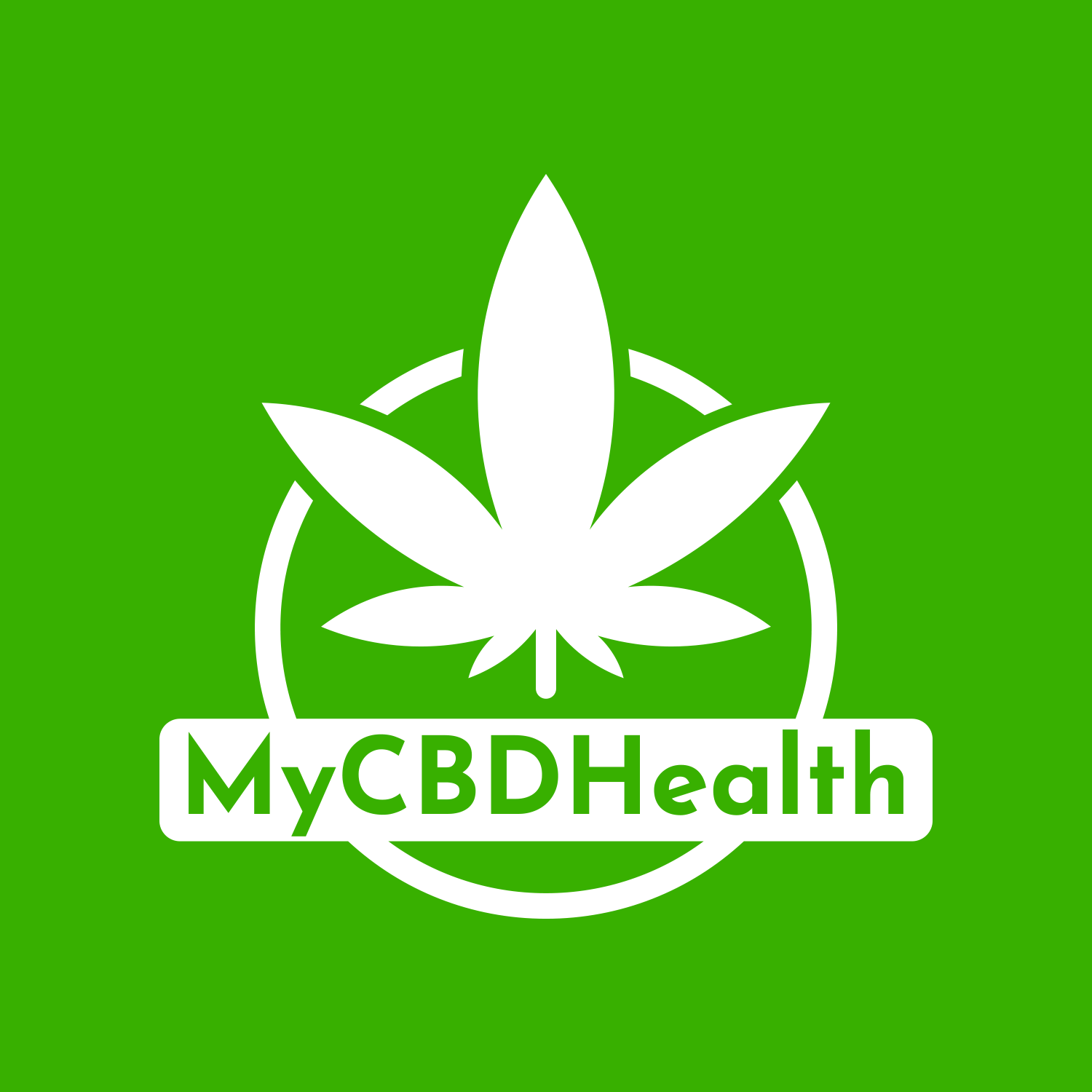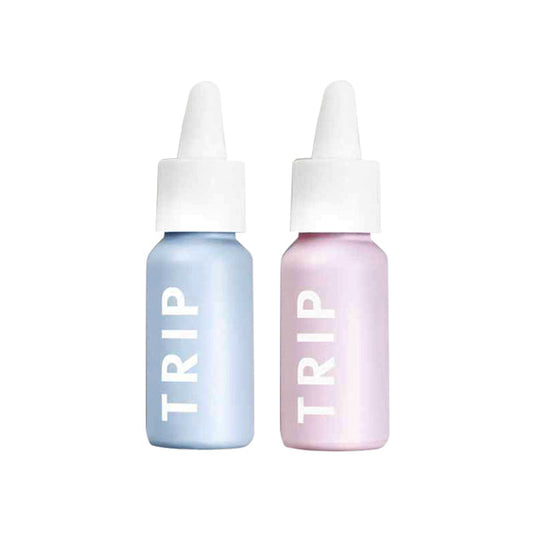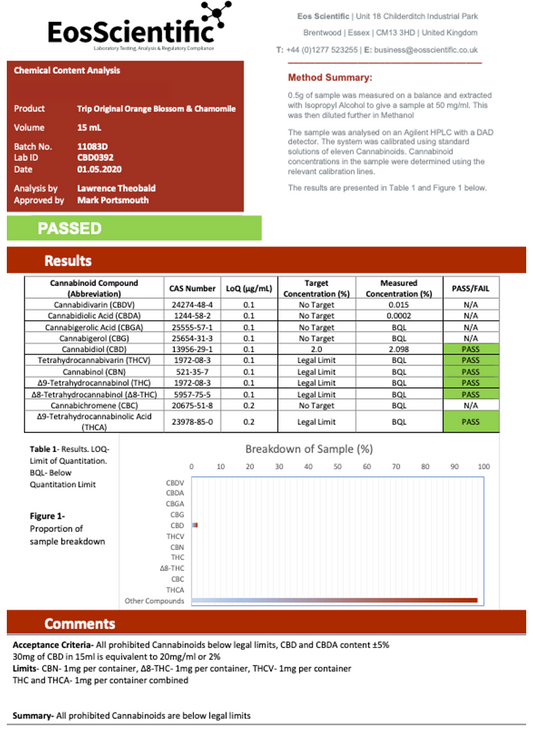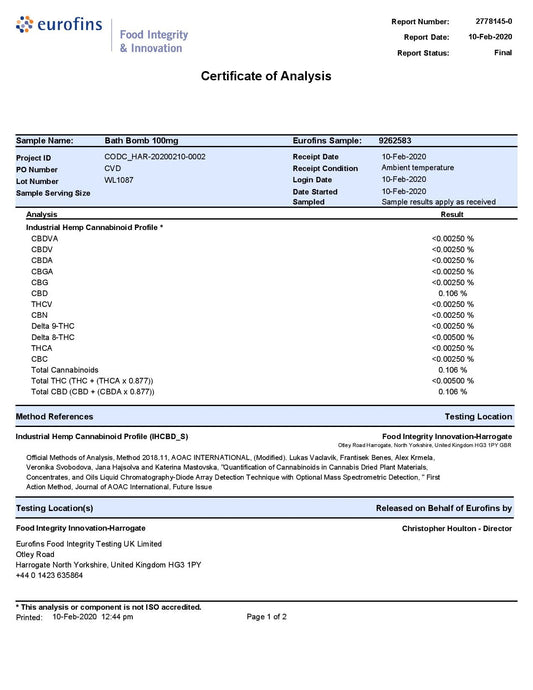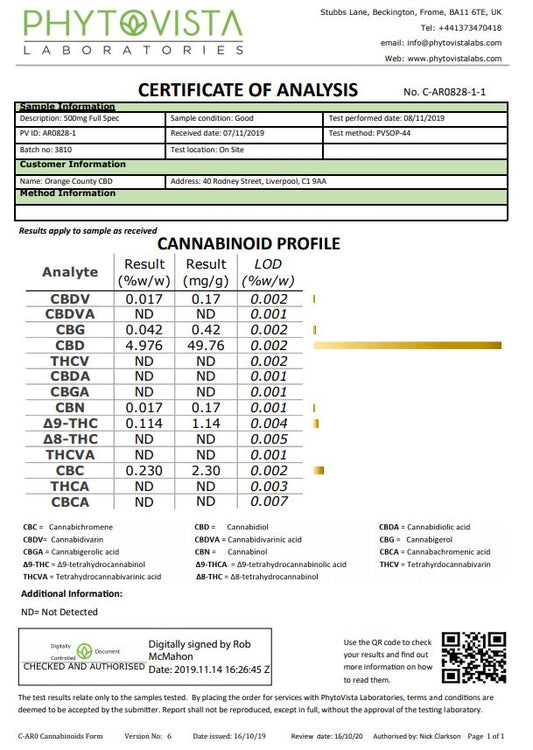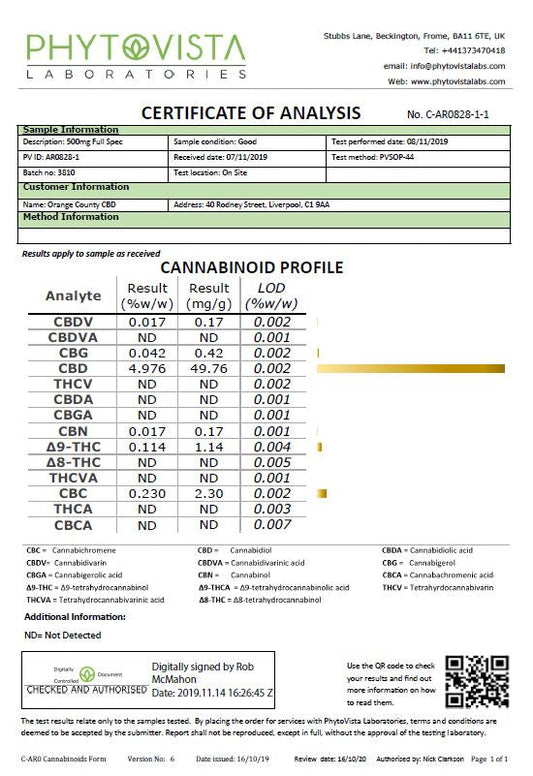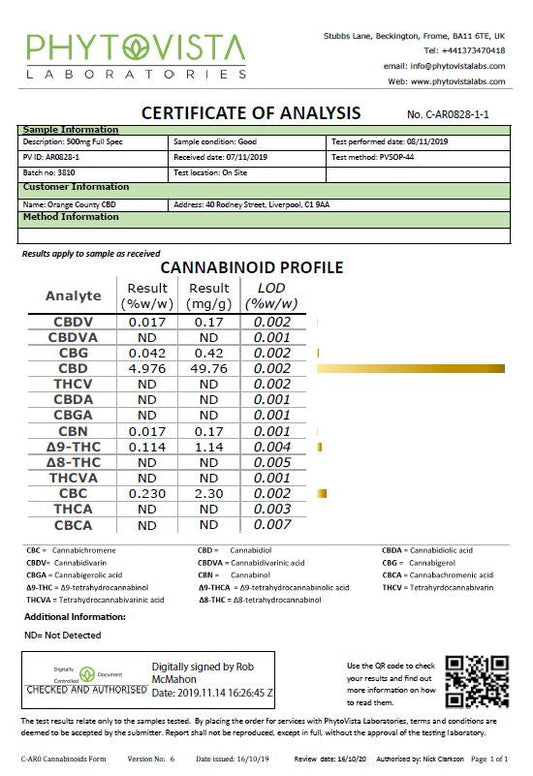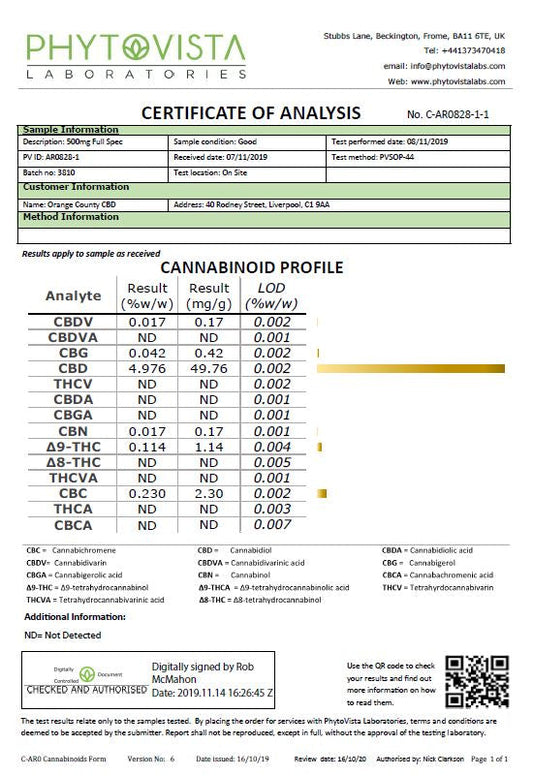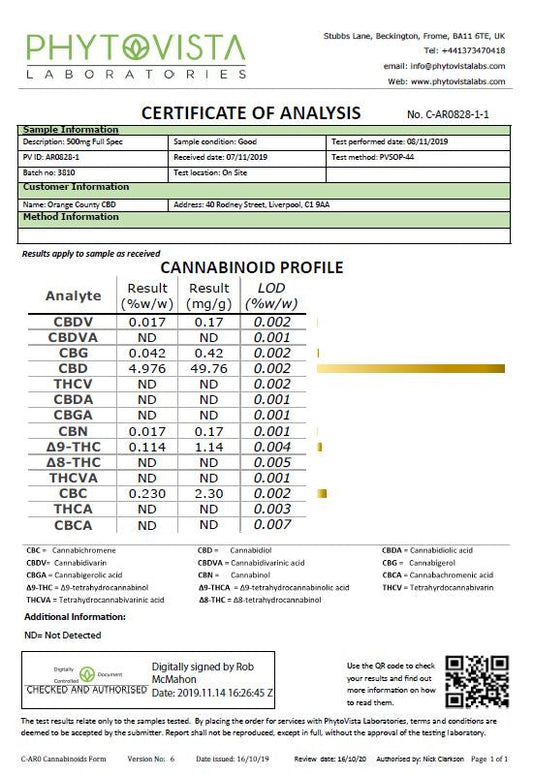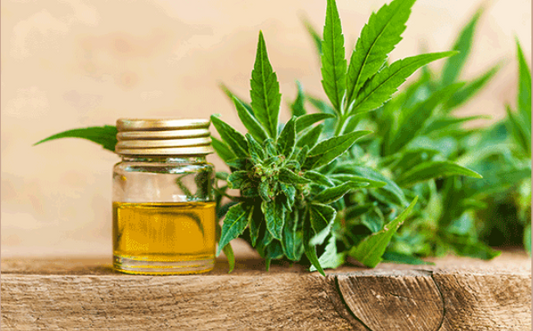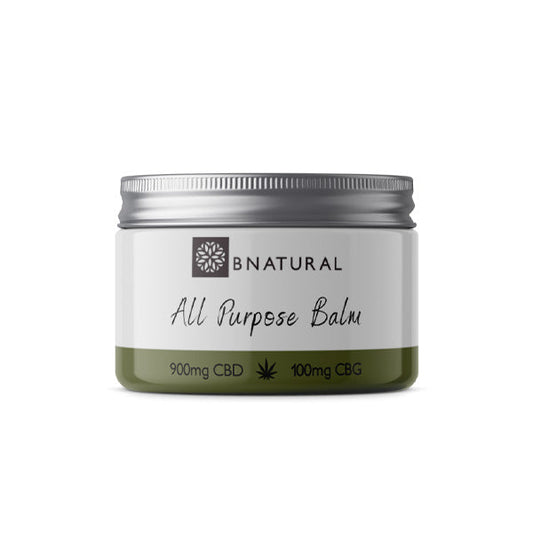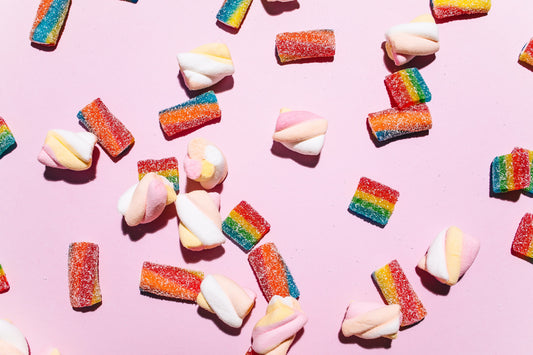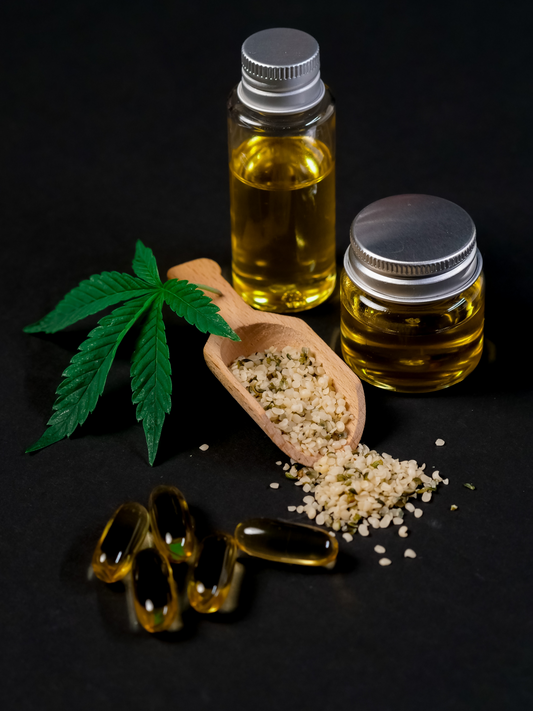-
Voyager 600mg CBD Body Butter - 250ml - with CBD, Shea butter and avocado oil
Regular price £19.52Regular priceUnit price per -
The Beemine Lab 3% 300mg CBD Oil Forte+ 10ml
Regular price £19.60Regular priceUnit price per -
The Beemine Lab 10% 1000mg CBD Oil Forte+ 10ml
Regular price £36.41Regular priceUnit price per -
The Beemine Lab 20% 2000mg CBD Oil Forte+ 10ml
Regular price £68.88Regular priceUnit price per -
Realest CBD 2000mg CBD 10ml MCT Oil (BUY 1 GET 1 FREE)
Regular price £32.47Regular priceUnit price per -
Realest CBD 500mg CBD 10ml MCT Oil (BUY 1 GET 1 FREE)
Regular price £13.69Regular priceUnit price per -
Trip CBD 1000mg CBD Oil With Chamomile 15ml
Regular price £29.27Regular priceUnit price per -
Trip CBD 300mg CBD Oil With Chamomile 15ml
Regular price £17.55Regular priceUnit price per -
Voyager 500mg CBD Blood Orange Oil - 30ml
Regular price £29.29Regular priceUnit price per -
Voyager 1500mg CBD Peppermint Oil - 30ml
Regular price £43.94Regular priceUnit price per -
Voyager 500mg CBD Peppermint Oil - 30ml
Regular price £29.29Regular priceUnit price per -
Voyager 1500mg CBD Natural Oil - 30ml
Regular price £43.94Regular priceUnit price per -
Voyager 500mg CBD Natural Oil - 30ml
Regular price £29.29Regular priceUnit price per -
Ritual London 60mg CBD Lip Treatment Oil 10ml
Regular price £10.45Regular priceUnit price per -
Sensi Skin 100mg CBD Beard Oil - 10ml (BUY 1 GET 1 FREE)
Regular price £11.40Regular priceUnit price per -
Ultracalm 20mg CBD Luxury Essential oil CBD Bath Bombs 170g (BUY 1 GET 1 FREE)
Regular price £9.41Regular priceUnit price per -
Voyager 220mg Beard Oil - 50ml
Regular price £14.65Regular priceUnit price per -
Orange County CBD 6000mg 30ml MCT Oil - Organic Coconut Oil
Regular price £139.99Regular priceUnit price per -
Orange County CBD 3000mg 30ml MCT Oil - Organic Coconut Oil
Regular price £89.99Regular priceUnit price per -
Orange County CBD 1500mg 30ml MCT Oil - Organic Coconut Oil
Regular price £59.99Regular priceUnit price per -
Orange County CBD 1000mg 30ml MCT Oil - Organic Coconut Oil
Regular price £49.99Regular priceUnit price per -
Orange County CBD 500mg 30ml MCT Oil - Organic Coconut Oil
Regular price £24.99Regular priceUnit price per -
LVWell CBD 1000mg 10ml Max Hemp Seed Oil
Regular price £29.52Regular priceUnit price per -
LVWell CBD 500mg 10ml Max Hemp Seed Oil
Regular price £18.04Regular priceUnit price per
About CBD Oil
What is CBD Oil ?
CBD oils contain the cannabinoid called cannabidiol (CBD), a molecule that is extracted from the hemp plant. CBD doesn't contain Tetrahydrocannabinol (THC), so doesn't give the 'high' sensation. Instead CBD works with your endocannabinoid system (ECS) to help how your body achieves balance - see our blog here for more detailed explanation.
How do I take CBD Oil ?
CBD Oils are available as drops and tinctures, and even as oral sprays. The most effective way to take CBD Oil is sublingually (under the tongue). Simply place a few drops under your tongue and leave for 30-60 seconds before swallowing. The oil is absorbed into your bloodstream by capilliaries in the sublingual layer under your tongue. You can also add drops of CBD Oil to your food, and effects will be felt after 1-2 hours depending on digestion and metabolism.
As with all CBD products the time until effects are felt may vary, depending on personal factors such as your body weight and metabolism. We advise to start with low doses initially, gauge your reaction and increase gradually over time if required.
How can CBD Oil help me?
Research suggests CBD Oil may have many positive effects including;
- Reducing Anxiety and Depression
- Helping to manage Aches and Pains
- Aiding Sleep
Benefits of CBD Beverages vs. CBD Oil
CBD Drinks have a number of benefits compared to CBD Oil, firstly they are much more convenient to take, as they are pre-made so you can drink them any place at any time. In addition, CBD Drinks come in a range of delicious flavours so have great variety and taste fantastic ! Many CBD Oils have an 'earthy' flavour, and can often be quite pungent, whereas CBD Drinks have been created specifically with flavour in mind.
CBD Oil - What is it and How can it help ?
What is CBD Oil?
How to use CBD Oil
Is CBD oil legal?
What are the benefits of CBD oil?
Does CBD oil get you high?
Is CBD oil safe?
Can CBD oil help with anxiety?
Can CBD oil help with pain?
Are there any potential risks or drawbacks of using CBD oil?
What is the difference between CBD oil and hemp oil?
Can CBD oil help with sleep?
Can CBD oil help with cancer?
How long does it take for CBD oil to work?
Can CBD oil help with depression?
What is the recommended dosage of CBD oil?
Can CBD oil help with seizures?
Can CBD oil help with inflammation?
What is CBD Oil
CBD oil, which is extracted from the hemp plant, has become quite popular due to its potential health benefits. The main ingredient in CBD oil is cannabidiol (CBD), a non-psychoactive substance that has the ability to communicate with receptors in the body's endocannabinoid system. It is widely marketed as a natural solution for issues such as anxiety and chronic pain among other common ailments.
Depending on personal preference, CBD oil can be ingested orally or applied topically through various forms and concentrations including capsules, tinctures and creams. Contrary to its legal grey area and questionable effectiveness claims by some sources, many individuals have reported positive improvements in their overall well-being while using this product.|
How to use CBD Oil
CBD oil's popularity has grown as a natural treatment for several medical conditions, including pain relief and sleep disorders. If you're new to CBD oil, the prospect of properly utilizing it may seem overwhelming.
The great news is that using CBD oil comes as an easy and simple process. Firstly, select the proper concentration of CBD oil suitable for your needs from various options presented in different strengths ranging from 250 mg to over 1000mg per bottle. Before arriving at an optimal dose level record smaller dosages consumed beforehand. Determine what form suits your preference such as sublingual (under the tongue), topical (top surface directly applied) or oral presentation (consumed within edibles).
Furthermore, sublingual administration allows consumers to feel observable effects rapidly can take an average of twenty-five minutes or less. Before purchasing any product, checking out package labels is advisable. Professional firms underline dosage computations so customers searching for justifiable quantity or regularity may come across necessary guidance instead of buying blind-spots.
Finally, finding precise dosage arrangements facilitated by reliable firms should manifest personalized methods satisfying unique variables like body mass index and symptom severity levels representing viable consideration criteria essential for maximizing hemp-derived CBD effectiveness while simultaneously promoting personal health goals attainment.|
Is CBD oil legal?
CBD oil, which stands for cannabidiol oil, has become increasingly popular in recent years due to its potential health benefits. However, despite the growing popularity and availability of CBD oil products in many forms, there seems to be a lot of confusion over the legality of these products.
Here's the gist: hemp-derived CBD is legal on a federal level thanks to 2018 Farm Bill, but individual state laws carry their own stipulations that must be adhered to. So while it may be legal at the national level—provided it meets certain standards pertaining to how much THC (the compound responsible for getting user high)---it might not be permissible in your area depending on where you live.
While some states have legalized all forms of cannabis (including marijuana-based CBD products), others may only allow medical use or prohibit it entirely. As such,it is important for an individual interested in using CBD oil do his or her research on state laws before purchasing any CBD product.
What are the benefits of CBD oil?
CBD oil, derived from the cannabis plant, has garnered immense attention in recent times owing to its potential health advantages. One vital benefit of CBD oil is its proficiency in mitigating anxiety and stress levels which has been validated through studies indicating a decrease in symptoms related to social anxiety disorder and post-traumatic stress disorder (PTSD). Besides this, due to its neuroprotective properties, it can possibly decelerate the onset of neurological conditions such as Alzheimer's and Parkinson's.
CBD oil also possesses potent anti-inflammatory characteristics that fight pain and inflammation sans any psychoactive impact, distinct from THC that generates a "high."
Finally, non-prescribed availability of CBD oils across various states makes these alternative therapies easily accessible for individuals wishing to utilize them. Overall, CBD oil offers several benefits including stress/anxiety reduction while fighting painful muscle inflammation without affecting one’s emotional state - all at an affordable price!
Does CBD oil get you high?
CBD oil is not known for its intoxicating effects, and is quite distinct from THC, the latter being responsible for producing a high. CBD (cannabidiol), which comes from cannabis plants such as hemp, is a non-psychoactive component of the plant that does not lead to an altered mental state.
Depending on how it's extracted, CBD oil derived from hemp may contain less than 0.3% of THC if any at all. Therefore, users are unlikely to experience feelings of altered consciousness or euphoria despite some using it recreationally irrespective. In contrast however, highly concentrated amounts will inevitably pose health risks further increases in drug composition can only lead irreparable physiological harm.
It should be mentioned that different kinds of CBD products carry different levels of psychoactive substances since variety usually determines potency depending on derivative plants ranging from the potent marijuana plant to much milder industrial hemp derivatives such as Charlotte Web or Hempura.
To avoid unwanted side effects arising particularly related to mood alteration or addiction involved with other illicit drugs, customers should always purchase their goods through credible stores that perform impartial third-party chemical tests and can certify legal limits are abided by.
Is CBD oil safe?
When used moderately and appropriately, CBD oil is generally considered safe for most people. However, because each person's body is different, individual responses to CBD may vary. Here are some essential points to consider regarding the safety of using CBD oil:
Side Effects: In some individuals, CBD oil may cause mild side effects but are usually well-tolerated. These negative symptoms can include dry mouth, diarrhea, fatigue, changes in appetite, and drowsiness. Taking an initial low dose is crucial while gradually increasing it as needed and monitoring how your body reacts.
Drug Interactions: There might be interactions between certain medications and CBD as it inhibits specific enzymes responsible for metabolizing many drugs within the liver potentially leading to increased concentrations of these medications in the bloodstream causing adverse effects. Therefore medical consultation is important before you use any prescription medication alongside CBD oil.
Quality & Purity: The quality and purity level of any product affects its safety levels too; similarly when it comes to selecting a reputable manufacturer from GMP certified vendors that provide third-party lab tests result to make sure there aren't any impurities like pesticides or heavy metals found are key indicators too.
Legal Considerations: Legal status related issues vary in different countries with regards to Hemp Derived products such as oils; It's wise knowing local laws regulations surrounding this substance or applicable policies in order not breaking compliance laws attached.
Individual Sensitivity: Considering different implications carefully can help sensitive individuals understand likely complications faced by health problems requiring consulting first if they plan on utilizing Cannabidiol Oil (CBD) for their illness management regimen instead of being under-direct medical supervision/care under a professional healthcare provider who has expert knowledge about Cannabidiol (CBD).
Any guidance or further information required should be asked from healthcare providers locally accessible Like every other supplement/health-related product we should be cautious making informed decisions taking into consideration concerns/questions if we have any about product efficacy/safety discussed above, upon consultation accompanying appropriate researches to guarantee apt decision-making
Can CBD oil help with anxiety?
CBD oil, or cannabidiol oil, has garnered significant attention in recent years for its potential therapeutic benefits. Specifically, CBD oil is believed to help alleviate symptoms of anxiety due to its ability to interact with the body's endocannabinoid system. This system plays a crucial role in maintaining balance throughout different bodily systems and many researchers believe that regulating this can have profound effects on overall health and wellness.
Additionally, anecdotal evidence suggests that individuals who struggle with anxiety may find relief from using CBD oil products. However, it is important to note that further research is needed to determine the exact mechanisms by which CBD functions in the body and whether it can provide a reliable treatment option for anxiety conditions over the long-term.
Can CBD oil help with pain?
The utilization of CBD oil has been linked to potential analgesic properties, which can greatly aid individuals in pain management. Such an oil is commonly used by those suffering from myriad types of pain, including chronic and neuropathic pain, inflammatory aches and discomforts associated with conditions like arthritis or fibromyalgia.
Research is still ongoing and developing further insight on the exact mechanisms through which CBD oil alleviates pain, but initial studies suggest that this beneficial substance interacts proficiently within one’s endocannabinoid system (ECS).
The ECS plays an integral part in regulating inflammation perception as well as how one's body responds to ensuing physical discomfort levels. Through interacting with one's cannabinoid receptors present within the ECS signal system; CBD helps manipulate said signals while simultaneously reducing the inflammation evident at a particular affected area.
By undergoing multiple researched studies thus far, CBD oil displays stand out promise with regards to viable pain management methods among various candidates. Such was illustrated by a FRONTIERS IN PHARMACOLOGY review compiled back in 2018 through various sources of analysis documenting this optimal solution for numerous distinctive kinds of common ailments that yield severe discomfort.
Moreover, when officially published in THE JOURNAL OF CLINICAL MEDICINE during 2020 researchers made it clear that they had demonstrable evidence supporting terminally relieving qualities bestowed courtesy of such specialized organic hemp medication.
Are there any potential risks or drawbacks of using CBD oil?
Although CBD oil is widely considered safe, there are a few drawbacks and associated risks that should be taken into consideration. These include drug interactions, side effects, labeling and quality issues due to the lack of regulation, unknown long-term effects, and potential misleading claims made by some CBD oil products.
One important consideration is drug interactions; CBD can interact with certain medications metabolized by the liver's cytochrome P450 enzyme system which could lead to altered levels in the bloodstream. Hence consulting with a healthcare professional before using CBD if you're taking medication is highly recommended.
Side effects from taking CBD oil are rare but may include dry mouth, diarrhea, drowsiness, fatigue various changes in appetite and mood making self-monitoring necessary after commencing therapy. Furthermore unreliable quality assurance procedures regarding third-party testing muddy chances of accurate labeling hence it is important to asses products from reputable companies prior purchasing novel products.
Moreover considering the limited amount of published data on its long-term impact on patients means there might be unforeseeable implications tied along prolonged usage for health enthusiasts who may heavily rely on these products without adequate scientific support. The lack of mandatory comprehensive regulation has resulted in inconsistencies between different brands leading to varied constituent substances even within batches of identical brands.
What is the difference between CBD oil and hemp oil?
CBD oil and hemp oil are two distinct products extracted from the hemp plant, with differences in composition, extraction methods, and uses. Let me go over their disparities for you:
Firstly, let's talk about CBD oil. It is made by isolating cannabidiol (CBD) from the flowers, leaves, and stalks of the hemp plant and contains a high concentration of CBD (as well as permissible amounts of THC - less than 0.3% per US law). CO2 or solvent extraction techniques may be used to obtain the desired outcome.
CBD oil is favored due to its therapeutic properties that help with pain relief, reducing inflammation levels in one’s body especially when addressing anxiety-related issues ameliorating sleep quality.CBD is absorbed orally. You can also get it via sublingual zones on your mouth cavity or even inhale it into your lungs through vaporization.
On the flip side, there exists another product known as Hemp Oil. A key contrast between these two items is their composition; Hemp seed oil - also referred to as simply "hemp oil" - is derived from seeds discovered inside the genus Cannabis Sativa. Through pressing, nutritional content including essential minerals like fatty acids and vitamins are preserved.
In addition, it can be used in culinary applications to enhance food with nutty flavours or as an occasional dip for ultimate satisfaction.
The second use is for skincare products. It moisturizes and nourishes while simultaneously rendering a visually attractive appearance through long-term application of sustaining moisture levels allowing for multiple skin related uses.
Can CBD oil help with sleep?
CBD oil is believed by many to have the potential to improve sleep quality and address sleep-related disorders. Despite still being a field of emerging research, more and more evidence suggests that CBD may be able to offer numerous benefits.
The endocannabinoid system in our bodies plays an essential role in regulating our physical processes, specifically when it comes to controlling sleep-wake cycles. CBD has been found to potentially interact with certain receptors within this system, which may help modulate sleeping patterns and encourage relaxation.
Various studies have explored how CBD affects people's sleep habits. For example, a study from The Permanente Journal published in 2019 indicated marked reductions in anxiety scores after a month of daily CBD intake together with improvements reported by patients on the quality as well as quantity of their sleep across this period.
Can CBD oil help with cancer?
CBD oil has been the subject of research and interest in relation to its potential effects on cancer, but it's important to note that the research is still in its early stages, and more studies are needed to draw definitive conclusions. Here's an overview of the current understanding:
Anti-Cancer Properties: Some laboratory and animal studies suggest that CBD may have anti-cancer properties. CBD has been found to inhibit the growth of cancer cells and promote apoptosis (cell death) in certain types of cancer, including breast, lung, colon, and prostate cancers.
Potential for Symptom Management: CBD oil has shown promise in managing symptoms associated with cancer and cancer treatments. It may help reduce pain, inflammation, nausea, vomiting, and improve appetite and sleep in cancer patients undergoing chemotherapy or experiencing cancer-related symptoms.
Adjunct to Cancer Treatment: CBD oil is not a substitute for conventional cancer treatments such as chemotherapy, radiation therapy, or surgery. However, it may potentially be used as an adjunct therapy to help manage symptoms and improve overall well-being.
Limited Clinical Evidence: While some small clinical studies have shown positive results, larger, well-designed clinical trials are still lacking. Many of the existing studies have limitations, such as small sample sizes or animal-based research. Therefore, more rigorous research is needed to determine the efficacy and safety of CBD oil in cancer treatment.
Consultation with Healthcare Professionals: If you or a loved one is considering using CBD oil as part of cancer treatment or symptom management, it is crucial to consult with healthcare professionals, such as oncologists or oncology specialists. They can provide guidance, consider potential drug interactions, and ensure it complements the overall treatment plan.
It's important to approach claims of CBD oil as a cancer treatment with caution. While early research is promising, it's not yet a proven or standardized therapy for cancer. Ongoing research will help to provide more comprehensive insights into the potential role of CBD oil in cancer treatment and symptom management.
How long does it take for CBD oil to work?
CBD oil can take a variable amount of time to start working depending on several factors like the way it's consumed, dosage, individual metabolism and targeted condition. Here are some general predictions:
Your method of consumption will impact onset speed; using sublingual drops (located under the tongue) with retention for 1-2 minutes is faster than just swallowing directly. Sublingual CBD usually presents effects within 15-30 minutes because this method allows direct absorption into the bloodstream, whereas oral ingestion needs longer due to digestion.
Body factors contribute to varying times of effect. Every person's body makeup differs regarding their metabolic rate, body weight and internal chemistry.
Long-term use also influences how quickly people respond; regular usage may see benefits accumulate and present over time rather than all at once. Start small when dosing CBD until you develop tolerance/correct dosages for your target results/symptoms.
It is important to remember that there is no uniform timeline and everyone reacts differently to CBD products so another person's experience or advice could differ from yours.
Can CBD oil help with depression?
CBD oil gained significant popularity among individuals struggling with various mental and physical health issues. The majority of people are fascinated by its potential ability to provide relief from symptoms including anxiety, chronic pain, and even depression.
Although several studies support the use of CBD oil in reducing anxiety, the effectiveness of this natural remedy for treating depression is still inconclusive. Despite a lack of unanimity among researchers regarding the benefits of using CBD oil for depression, early reviews have been promising. According to some reports, it is believed that CBD oil promotes healthy brain function by facilitating serotonin synthesis; decreased levels of this neurotransmitter have often been linked to mood disorders such as depression and anxiety.
However, it's essential to note that taking CBD oil alone cannot significantly reduce symptoms related to mental illnesses like Depression completely. Therapeutic approaches should factor in a range of psychotherapeutic treatments like cognitive-behavioral therapy (CBT).
It's necessary you involve your general healthcare provider before trying out any supplements to know how best they can integrate with other treatment or medications prescribed for your condition. In essence, an array of wellness angles must be taken under concentration when processing the therapeutic benefits derived from using this natural extract—factors ranging from legislative measures through sourcing and quality assurance amongst other concerns being beneficial as a reliable resource either as a standalone treatment option or complimentary addition alongside therapies prescribed by traditional health-care practitioners.
What is the recommended dosage of CBD oil?
Determining the perfect CBD dosage depends on several factors such as concentration, product type, body chemistry, health conditions, and required effects. It's essential to note that there isn't any universal dosage recommendation for CBD oil.
Here are some general guidelines you should follow:
Start With a Small Dose: Gradually increase CBD intake if necessary after starting with small dosages to minimize potential side effects and monitor body response.
Pay Attention to Product Labelling: A few manufacturers mention suggested product-dosage in packaging labels; however, individual needs may vary greatly. Make sure to examine your personalized requirement according to experience.
Individual Factors Matter: Certain elements of an individual like body weight or metabolism might play a significant part in developing appropriate optimum levels of CBD dosages.
Consult Health Professionals' Opinions: If unsure what dose requirements will fit your circumstances appropriately, always seek testimonials from healthcare professionals because every situation is unique, including personal history details, prescribed medications and underlying diseases etc
Gradual Titration Process Might Prove Useful: Try finding effective balance by slowly increasing the dose so that its netter absorbed other time also don’t forget monitoring how it impacts overall health difference is described as titration. Since each person has different effects when consuming CBD products identifying ideal dosages requires observation
Can CBD oil help with seizures?
CBD oil has the potential to lessen both the prevalence and intensity of seizures in particular types of epilepsy. One such identifiable form is called Dravet syndrome which clinical trials have revealed as having a substantial positive impact from CBD use.
In 2018, kids suffering from LGS and those linked to Dravet syndrome were awarded an FDA-approved Epidiolex-based drug known for its usage of CBD intending primarily to treat associated seizures. This was historic being that it was the first Cannabis-derivative medication sanctioned by US authorities.
There still exist muddled understandings about how precisely cannabis's active ingredient allays seizure presence but studies indicate that CBD interacts with various cerebral receptors spreading across cannabinoid receptors responsible for managing nervous activity along with vibrations. Researchers hypothesize that this interaction, alongside neuroprotective compounds within CDD may play a contributing role towards CBD’s ability to curb seizure related episodes.
Can CBD oil help with inflammation?
CBD oil has been touted for various health benefits and one of those is its potential to reduce inflammation in the body. It does this by interacting with the endocannabinoid system (ECS) in our body, which is responsible for maintaining homeostasis and regulating immune response.
As a result, CBD may help reduce pain associated with inflammatory conditions such as arthritis, Crohn's disease, or even acne. Inflammation occurs when our immune system recognizes an injury or infection and stimulates cells to move towards that area to fight off any pathogens invading that area.
Sometimes it can go into overdrive and begin attacking healthy tissue and causing damage, resulting in chronic inflammation. This condition can lead to various diseases such as diabetes or heart disease. Studies suggest that taking CBD oil orally may decrease inflammation by targeting specific pathways involved with the production of pro-inflammatory mediators called cytokines.
When consumed regularly, it can have potent anti-inflammatory effects on several types of inflammation within our bodies. To sum up, although further research is necessary for a thorough understanding of how cannabinoids work within the human body specifically regarding reducing inflammation; from what we currently know shows promising evidence suggesting CBD oil could potentially offer relief without intense side effects caused by traditional drugs like cortisol treatment.|
